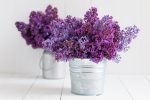In today’s busy world, most parents don’t get enough sleep. Not only because children wake up in the middle of the night, but due to the many demands and pressure they are under. Sleep plays a vital role in good physical and mental health. During sleep, your body repairs itself, works to support brain function and maintains your physical health. So, sleeping for less than 6 to 8 hours a night may negatively affect the quality of your life and put you at risk of serious health problems. Insomnia, or the chronic inability to fall asleep, stay asleep or achieve high-quality sleep can be caused by psychiatric and medical conditions, unhealthy sleep habits, specific substances, and/or certain biological factors.
Caffeine-free herbal teas have long been a popular beverage of choice when it comes time to relax and unwind, especially at nighttime. In Ayurvedic medicine, teas have been used to keep the body in balance and around the world, they have been used as natural sleep remedies. Read on to find out about our top 5 choices.
Chamomile
Chamomile is perhaps the best known tea around. Made from dried chamomile flowers, it has been used as a natural remedy to reduce inflammation, ease menstrual cramps and gas, decrease anxiety and treat insomnia. Its calming-soothing and sedative effects may be attributed to an antioxidant called apigenin, which binds to specific brain receptors that are thought to decrease anxiety and help initiate sleep.
Valerian Root
Valerian Root has been historically used to treat problems like insomnia, nervousness and headaches. Recent studies have found that Valerian Root may stimulate the brain’s gamma-aminobutyric acid, or GABA receptor, a neurological gateway for sleep-inducing chemicals. When GABA is present in large amounts, it may induce sleepiness. No adverse side effects, such as morning drowsiness, were observed after drinking this tea. However, many of these findings are inconclusive. Valerian Root may also improve the overall quality of sleep by shortening the time it takes to actually fall asleep.
Lavender and Rose
The combination of Lavender and rose is the perfect nighttime beverage. Lavender is a herb that is known for its aromatic and soothing scent, while rose tea has natural sedative properties. Lavender tea is made from the small purple buds of the flowering plant and rose tea is made from the dried whole blossoms or the petals. Many people drink lavender tea to relax, decrease anxiety and improve their sleep quality. Rose tea may reduce inflammation, ease stress and regulate hormones related to the circadian rhythm (sleep/wake cycle) and sleep patterns
Lemon Balm
Lemon Balm belongs to the mint family and is commonly used to make infusions with its dried leaves to treat chronic sleep issues. This citrus-scented, aromatic herb has also been used for reducing stress and improving overall sleep quality. Research has shown that Lemon Balm may act as a sedative, increasing GABA levels similar to the how Valerian Root acts. Pairing these two herbs would be an optimal way to treat sleep-related problems.
Passionflower
Passionflower tea is made from the dried leaves, flower buds and stems of the Passiflora plant. Traditionally, it has been used to alleviate anxiety, improve overall sleep quality and insomnia. Often it is paired with Valerian Root to treat insomnia because it also seems to raise the levels of GABA in your brain. This compound lowers brain activity, which may help you relax and sleep better. In a published study, participants drank herbal tea made with passionflower. After seven days, they reported improvements in the quality of their sleep. The researchers suggest that passionflower may help adults manage mild sleep irregularities.
For more informative articles or parenting tips, visit Mommy Authority here.



